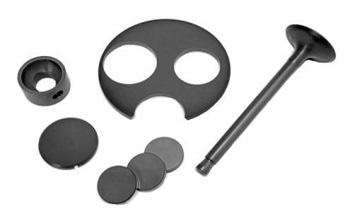Advanced sialon ceramics are designed for many high-temperature applications, competing with reputable technical ceramics and refractory materials with their high strength and durability features. These mechanical features are accompanied by exceptional thermal shock resistance, providing highest physical stability under a range of thermodynamic conditions.

In this article, the importance of thermal shock resistance and thermal expansion coefficient in high-temperature applications will be explored, while the thermal properties of sialon ceramics are outlined.
Thermal Shock Resistance
Thermal shock resistance is a material’s ability to endure the strain of sudden and substantial changes in temperature. Sharp thermal gradients can cause warping of a material through varying expansion or contraction. If the strain of a thermal shock surpasses the strength of the material, it can cause cracking, mechanical deformation, and premature component failure.
Thermal shock resistance is measured as a change of temperature (ΔT °C) and is calculated by evaluating the difference between a ceramic’s maximum temperature use and the temperature of the quenching media. These variances are regulated by the material’s thermal conductivity and the coefficient of heat transfer between a ceramic and the cooling material. The complete formula for establishing the thermal shock parameter requires the tensile strength, thermal conductivity, and Young’s modulus of a material.
Importance of Thermal Shock Resistance
Materials with high thermal shock resistance are essential for refractory components that experience quick variations in temperature. Molten metal crucibles, thermocouple protection sheaths, and hot-dip ceramic hooks are regularly manufactured to resist sudden temperature gradients. The metallurgical and energy sectors often require high thermal shock-resistant ceramics for these particular applications.
Technical Ceramics and Thermal Shock Resistance
Technical sialon ceramics are made for refractory applications, delivering enhanced thermodynamic capacities over proven industry materials such as zirconia (ZrO2) and alumina (Al2O3). They are unique for their excellent balance of mechanical and thermal properties, including greater thermal shock resistance and mechanical integrity under temperatures beyond 1400 °C (2552 °F). This culminates in extremely high thermal expansion coefficients, which establish a material’s subjectivity to physical change because of temperature increases.
Advanced sialon ceramics display such exceptional thermal shock resistance because of their high peak temperature capacities, low thermal conductivity, and their excellent mechanical strengths. These qualities arise from the full density composition of the material, which is made of covalent atomic bonding and strong interlocking grains of silicon nitride.
International Syalons offers numerous grades of sialon ceramics with different thermal shock resistance qualities, including:
- Syalon 101: An advanced ceramic with excellent strength values and a maximum use temperature of 1200°C (2192°F) and a thermal shock resistance of ΔT = 900°C when quenched in cold water.
- Syalon 110: Featuring a thermal shock resistance of ΔT = 800°C for cold-water quenching and a remarkable maximum use temperature of up to 1450°C (2642°F).
- Syalon 050: A wear-resistant ceramic with maximum abrasive resistance and high mechanical stability at temperatures of up to 1450°C, displaying a thermal shock resistance of ΔT = 600°C for cold-water quenching.
- Syalon 501: An electrically conductive sialon grade ideal for intricate component machining, with a thermal shock resistance of ΔT = 400°C for cold-water quenching.
Thermal Expansion Coefficient
Solid materials usually expand when exposed to higher temperatures and contract when they are cooled, a recognized phenomenon that nevertheless signifies different challenges for component materials in challenging thermal applications. The coefficient of thermal expansion denotes the behaviour of distinct materials exposed to temperature variations at consistent pressures. This value establishes the severity of material-size changes per degree of temperature change in a volumetric or linear plane, both of which are expressed as n x 10−6/K.
Importance of Thermal Expansion Coefficients
The magnitude of thermal expansion usually increases simultaneously with rising temperatures. At relatively low thermal values, the thermal expansion coefficient is expected to exhibit a proportional relationship between expansion and increased temperature. Greater thermal values complicate the thermodynamic features of solid expansion but mostly in instances where components are physically forced. Dimensional changes in such examples can cause materials to fracture and fail, so low expansion materials are desirable in refractory applications with stiff equipment or component housings.
Technical Ceramics and Thermal Expansion Coefficients
Technical ceramics usually display lower thermal expansion coefficients than metals because of their low thermal conductivity and unique structural makeup. Metal alloys tend to display thermal expansion coefficients in the range of 10–30 x 10−6/K. Sialon ceramics possess thermal expansion coefficients as low as 3.0 x 10−6/K, reflecting ultra-low subjectivity to expansion at extreme temperatures. This resistivity to thermal expansion also enables the material to preserve its physical integrity during continuous use, whereas conventional materials may start to show signs of thermal warping or risks of fracture during long-term service life, or endless hours of operation.
Sialon Ceramics from International Syalons
International Syalons has concentrated on the advancement of technical sialon ceramics for many years, having patented the material and refined it for individual application requirements. The company is committed to discovering new uses for the material and unravelling the maximum thermal and mechanical capacities possible. Many of the company’s sialon grades have been enhanced to offer the lowest possible thermal expansion coefficient of 3.0 x 10−6/K, including Syalon 050, Syalon 110, and Syalon 101. This entire group of ceramics is extremely formable and can be used in a huge range of applications.
International Syalons also offers numerous grades of sialon ceramics with excellent thermal shock resistance qualities, including:
- Syalon 101: An advanced ceramic with excellent strength values and a maximum use temperature of 1200°C (2192°F) and a thermal shock resistance of ΔT = 900°C.
- Syalon 110: Featuring a thermal shock resistance of ΔT = 800°C and a remarkable maximum use temperature of up to 1450°C (2642°F).
- Syalon 050: A wear-resistant ceramic with maximum abrasive resistance and high mechanical stability at temperatures of up to 1450°C, displaying a thermal shock resistance of ΔT = 600°C.
- Syalon 501: An electrically conductive sialon grade ideal for intricate component machining, with a thermal shock resistance of ΔT = 400°C.
International Syalons has been closely involved in the continuing development of advanced sialon ceramic materials. The company is the first to patent and develop sialons for industrial applications, offering a new material solution for high-temperature and abrasive applications. International Syalons’ sialon grades feature unique hardness profiles and thermal properties for various applications, with good degrees of formability spanning the entire material group.

This information has been sourced, reviewed and adapted from materials provided by International Syalons.
For more information on this source, please visit International Syalons.